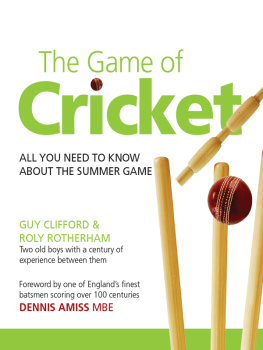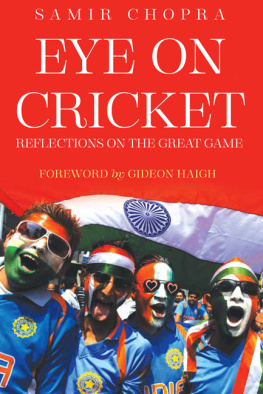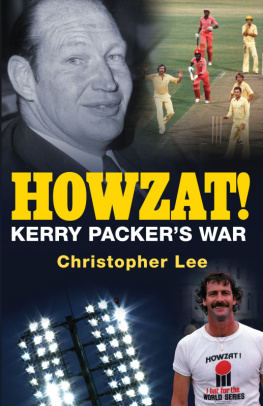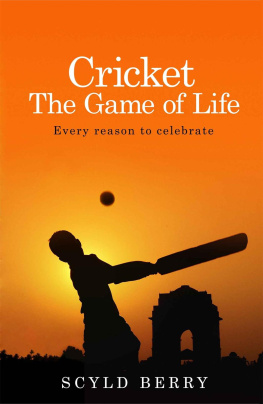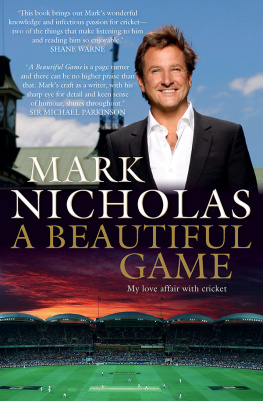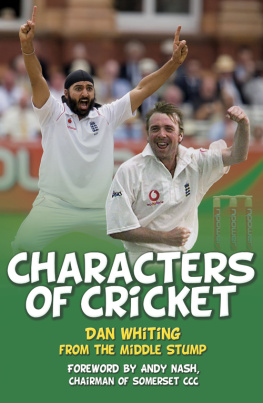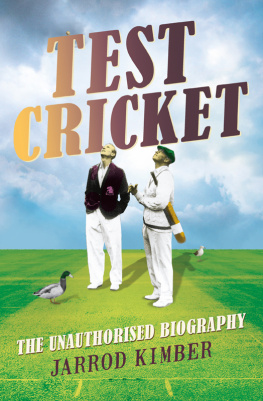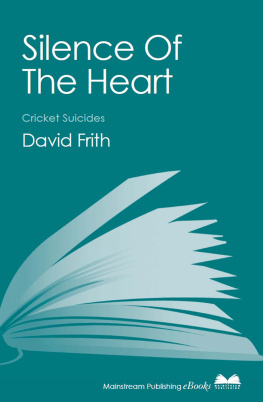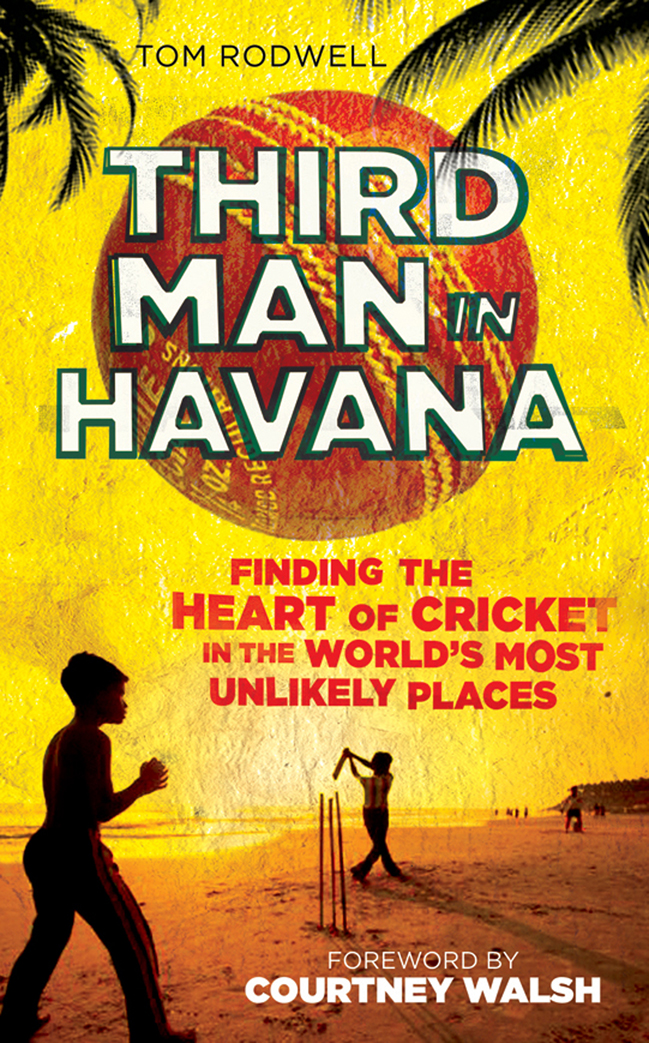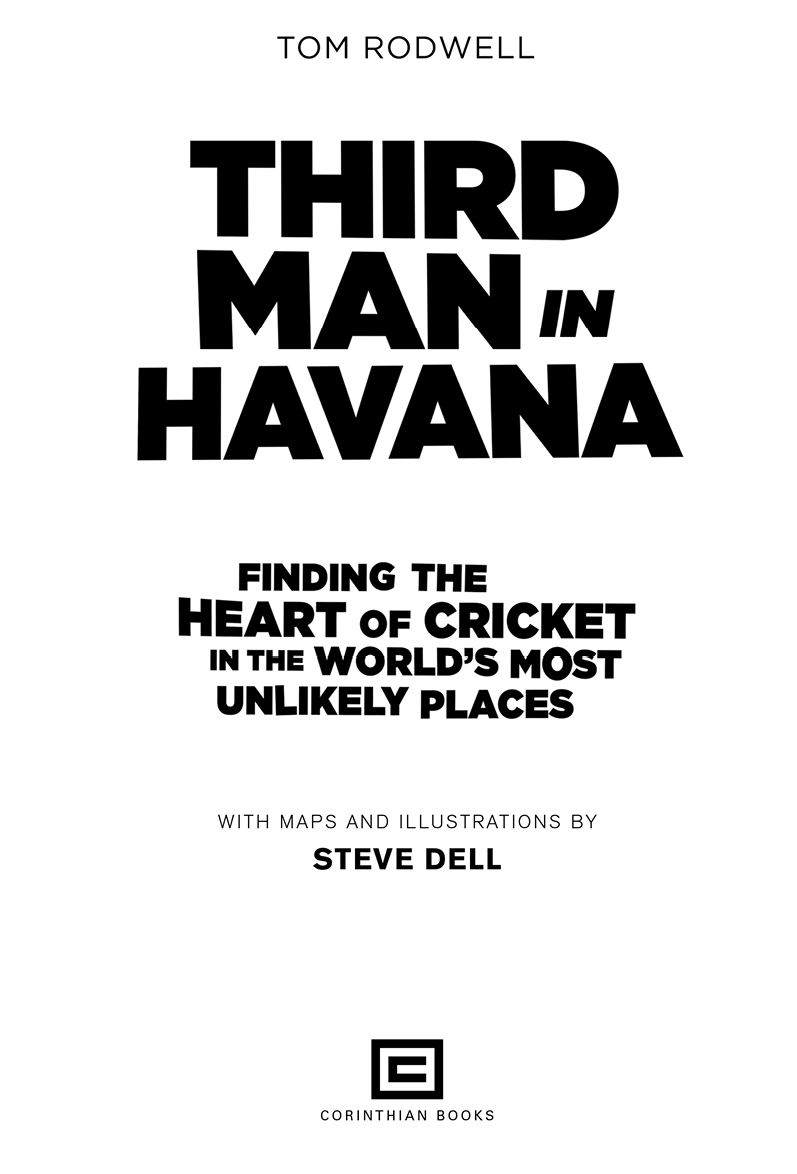John Arlott said that above all cricket is a human game, and in the end its the people met on my cricketing journey that make everything worthwhile. From Shabby, my terrible wicket-keeper, to Julien Cahn, who first got me involved in a cricket charity and introduced me to Reg Scarlett at the Haringey Cricket College in London. Mikey Thompson and Tony Joseph were pupils at the college and have been with me most of the way. Huge respect and love to those guys, Mikey now back in Jamaica and Tony in Qatar.
Abroad the list is endless, and although its invidious to isolate particular individuals whove made a difference, the following is a small sample of people who Im proud to have met along the way: Courtney Walsh, Brian Breese and Jimmy Adams in Jamaica; Leona Forde in Cuba; Liliana Fernandez in Panama; Clifford Hinds and Jeff Thompson in New York; George Sheader and Abu Hamed in Israel; Jayananda Warnaweera and Philippe Duamelle in Sri Lanka; Norman Nyaude in Zimbabwe; Nicholas Muramagi, Simon Ojok and John Nagenda in Uganda; Charles Haba in Rwanda; Elijawa Jacob in Tanzania; Sidney Benka-Coker and Francis Mason in Sierra Leone. All these and many others have achieved far more than I ever could, using their talents, whether cricketing or not, to help solve all sorts of different issues in the countries they love.
Finally, thanks to my editor Ian Marshall for persuading me to write the book, and for shepherding its progress, and special thanks to artist Steve Dell for his wonderful wibbly-wobbly drawings and maps.
FOREWORD
by Courtney Walsh
I consider it a great honour to be asked to pen a few words to introduce Toms book Third Man in Havana. Its an opportunity to say thanks, because it was he and his charity colleagues who helped me to set up The Courtney Walsh Foundation a few years back.
Although the aims of the Foundation sound a bit serious to inspire and empower positive change in Jamaicas disadvantaged young people in order to improve their prospects in education, training and employment its really just about using cricket in different ways to help loads of kids, while having fun at the same time. This is just what Toms written about in this wonderful book.
The book is set not just in countries where crickets a passion, like Jamaica, but also where its much less well-known, such as in Israel and Cuba. Although Cuba is very different from Jamaica, its not far away, and Ive been able to see for myself the interest that there is in cricket in a country that, like Jamaica, is mad about its sport.
Its my privilege, being an ambassador-at-large for Jamaica, to be able to travel the world to help my country. One of those trips was to London, and it was there that I was introduced to tapeball cricket, a basic version of the game that was being played on a basketball court underneath a motorway. Now thats very different from the sort of cricket I played, but I could see that the kids from the area were having a ball, under the watchful eye of their coach Mikey Thompson, who is now head coach of the foundation back in Jamaica, where he grew up.
I was lucky when I was growing up in Jamaica. Being part of a strong family kept me on the straight and narrow. But others arent so lucky, and if we can get them playing cricket, understanding about fair play, and enjoying themselves in a team, then theres a better chance that theyll become good citizens and, who knows, even play for the West Indies like I did.
Coming to England to play county cricket for all those years opened my eyes to what cricket had to offer, and being able to represent my country, Jamaica, at the same time led to my dream coming true: playing for the West Indies, alongside some of the greatest players in the history of the game. This enabled me to travel to wherever cricket was played, and I was paid for the privilege. But I always tried to remember my roots, to respect my opponents and always to give my best.
But cricket isnt just about what goes on at the top level its about having fun, and it can also be about helping make a difference to peoples lives. I have seen how cricket has changed the lives of many, whether they be prisoners, the disadvantaged or the disabled. This book tells some wonderfully uplifting stories from all around the world, about how the game has helped such people always with fun at the heart of that help.
This book makes me feel good about the game I love, and I learned a few things too. I had to laugh about Toms catch off my bowling in Spanish Town jail, though. Honestly, despite what he says, it was a really easy one!
Remember, if we all help one another we can all have a good time.
One Love,
The Hon. Courtney Walsh, Order of Jamaica, Ambassador-at-large
INTRODUCTION
This book is the story of what happened when an ordinary cricketer whod had years of fun playing the game at home and abroad was given the chance to use the game to help young people from around the world. These young people were often suffering from all sorts of disadvantages, but we were able to help them to get to know cricket, have fun playing it and maybe even improve their lives.
Its the story of eighteen trips to twelve countries over a six-year period, from 2005 to 2011; a story of government involvement and intrigue; of cricketing authorities sometimes helping and sometimes hindering; of the struggle to get the projects off the ground; of incredible sights seen; but above all of the amazing people met along the way, people often working in very difficult and dangerous conditions.
Now this all sounds very worthy, but the essence of sport is fun, and this book describes work in some countries where cricket is hardly known, such as Israel, Rwanda and Cuba, as well as others where its embedded in their culture, such as Jamaica and Sri Lanka. But in all of them the cricket that is played and the young people that are encountered, victims of poverty, war or disability, bear witness to the power of the game to surprise, to entertain, and even to educate.


